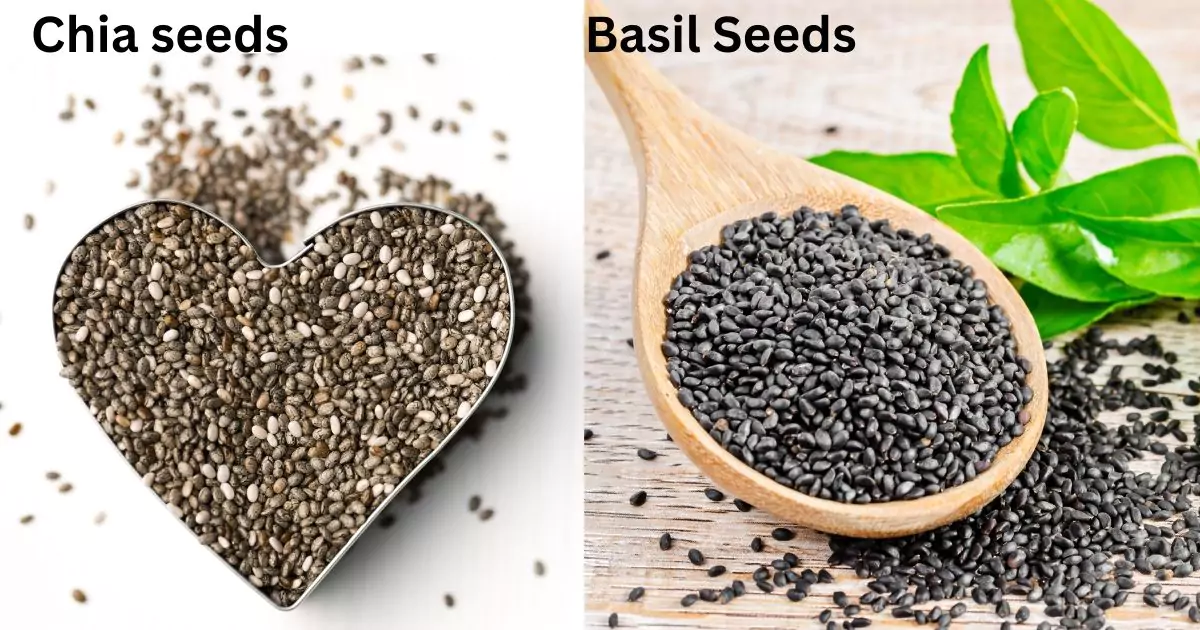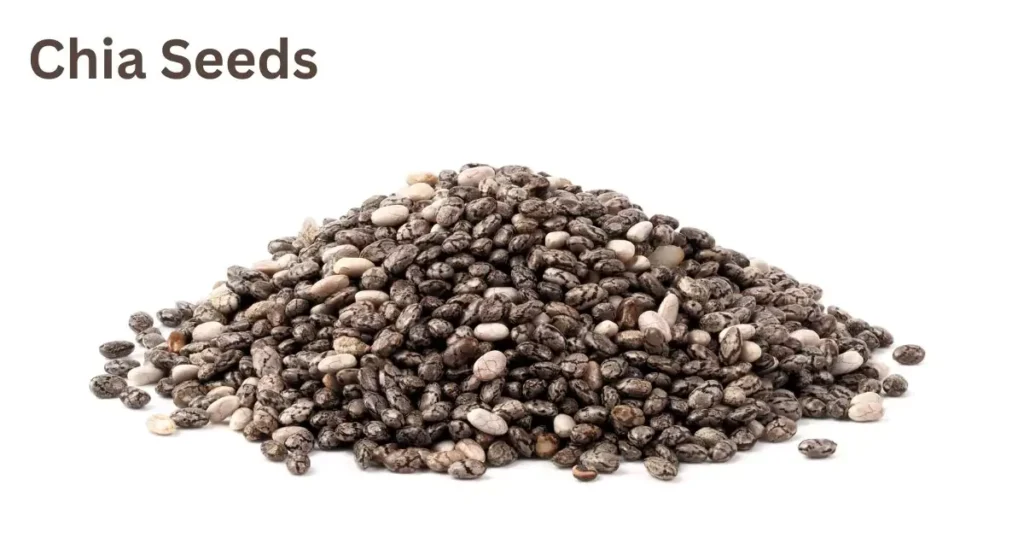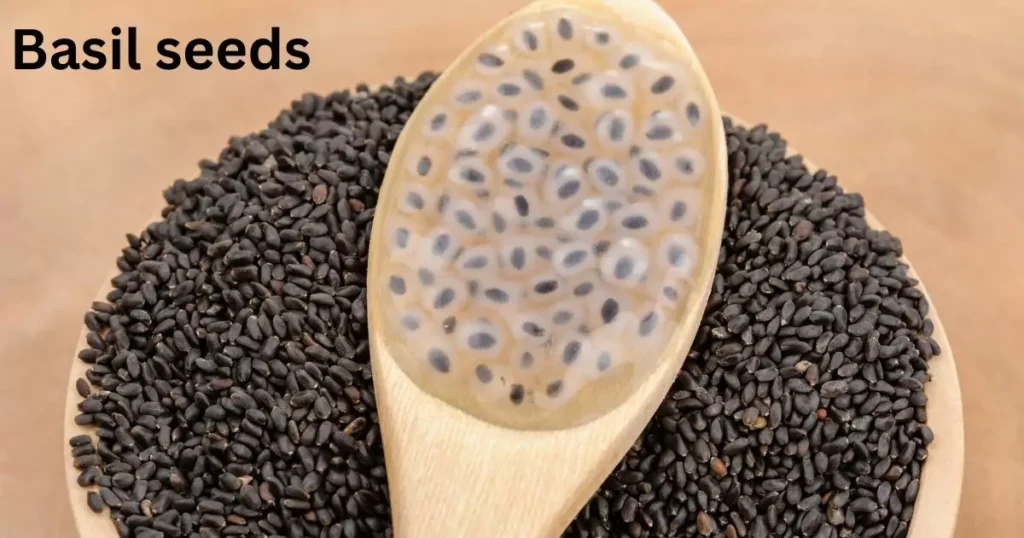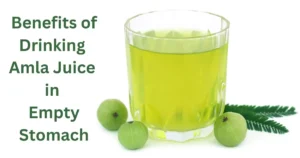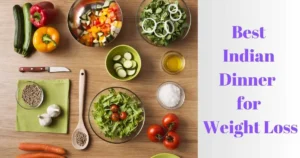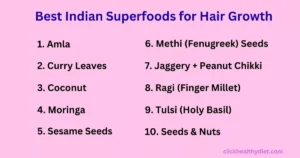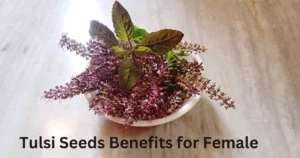Introduction
In this article, we explore the difference between chia seeds and basil seeds, compare their nutritional values and active components, and learn about the health benefits of these wonder seeds.
Consuming these tiny yet powerful seeds, including basil and chia, can play a significant role in alleviating symptoms of health conditions such as diabetes, obesity, cardiovascular diseases, and certain types of cancer.
They are rich in bioactive components, including polyphenols, carotenoids, vitamins, dietary fiber, fatty acids, sterols, and bioactive peptides, all of which contribute to their health-enhancing properties.
Read more: 10 Benefits of Drinking Amla Juice In Empty Stomach
Chia seeds
Chia seeds are tiny, oval-shaped seeds that are grey, with white and black spots, and are obtained from Salvia hispanica plants. Chia seeds are cultivated for their exceptional nutritional profile and numerous health benefits.
Chia seeds, when soaked in water or another liquid, absorb more than ten times their weight, forming a gel-like texture.
Chia seeds contain omega-3 fatty acids, polyunsaturated fatty acids, dietary fiber, protein, vitamins, and other vital minerals. Chia seeds are a great source of antioxidants and polyphenols that protect against the risk of chronic diseases.
Studies suggest that chia seeds possess anticancer, antihypertensive, and neuroprotective effects. Consuming chia seeds may reduce the risk of developing type 2 diabetes, coronary heart disease, certain types of cancer, Alzheimer’s, and Parkinson’s disease.
Chia seed consumption has been shown to support digestive health, strengthen bones and muscles, improve skin health, support brain development, and reduce the risk of heart disease.
It can be added to smoothies for added texture and nutrition. To make chia pudding, soak the seeds in milk or almond milk overnight, then refrigerate until ready to serve.
Chia seeds can be added as a topping to salads, yogurt, or oatmeal for an extra nutrient boost.
Basil Seeds
Ocimum basilicum, commonly known as sweet basil, yields seeds that are native to India. These tiny, teardrop-shaped black seeds are widely utilized in traditional medicine and the food industry.
Basil seeds contain a good amount of dietary fiber, protein, antioxidants, calcium, magnesium, flavonoids, and polyphenols.
Consuming Basil seeds is linked with multiple health benefits, which may help prevent diabetes and heart disease. It acts as an antioxidant, antimicrobial, and anti-inflammatory, and possesses anti-depressant properties.
In India, basil seeds are commonly used in desserts and beverages such as falooda and lemon water. It is usually soaked in water to form a gel-like formation before use.
6 Interesting Difference Between Chia Seeds and Basil Seeds
Chia seeds and basil seeds might appear quite similar, especially when soaked, as both develop a gel-like texture and are nutrient-rich. However, these seeds come from different plants and offer distinct health benefits and culinary uses. Let’s understand what the difference is between chia seeds and basil seeds.
Flavor and Taste: Chia seeds are tiny and neutral in taste, readily absorbing the flavors of the food or liquid they are combined with.
In contrast, basil seeds have a mild, nutty flavor and are frequently used in Indian cuisine.
Appearance: Chia seeds are oval and gray with white and black spots.
Basil seeds are tiny and black.
Nutrition: Chia seeds excel as a source of high-quality protein and omega-3 fatty acids, surpassing basil seeds in these nutrients.
However, Basil seeds offer a higher content of dietary fiber and alpha-linolenic acid, along with notable levels of vitamin E, vitamin A, and vitamin C.
Health: Chia seeds are beneficial in maintaining healthy cholesterol levels, supporting brain development, strengthening the immune system, promoting gut health, anemia, and aiding weight loss goals.
Basil seeds are used in traditional medicine for health conditions such as abdominal pain, skin issues like acne, helping lower the plaque formation of the arteries, vomiting, and urinary problems.
Anti-inflammatory and Antioxidant Activity: Chia seeds are abundant in polyunsaturated omega-3 fatty acids, which help reduce inflammation, enhance cognitive performance, and lower cholesterol levels.
In comparison, basil seeds are rich in phenolic and flavonoid compounds, providing potent antioxidant properties that protect the cells from free radical damage.
Culinary: Chia seeds are often added to smoothies, yogurt, and oatmeal for their high nutritional value.
Basil seeds have cooling properties used to lower body heat. The seeds of sweet basil are commonly used in summer drinks, beverages, desserts, and ice creams.
Precaution
People with allergies to seeds and nuts should be cautious when consuming basil and chia seeds.
Chia seeds and basil seeds both should be taken in moderation, 1-2 tablespoons spoon seeds soaked in water or other liquid to avoid any abdominal discomfort. Make sure you drink sufficient water to lower the risk of any abdominal discomfort.
People who are on blood thinners, taking hypertensive medications, or are under medication for diabetes should consult their doctor before adding chia seeds or basil seeds to their diet.
For pregnant and lactating mothers, consult your health expert before adding them to your diet, as there isn’t enough data to support their safety in these conditions.
People should limit chia seed consumption if they are suffering from thyroid and kidney conditions.
Conclusion
The difference between chia seeds and basil seeds goes beyond appearance and texture. From their distinct origins to their nutritional profiles and culinary uses, each offers unique benefits. While chia seeds are popular for high-quality protein, basil seeds are known as a good source of dietary fiber, aiding digestion. Understanding these differences can help you make informed dietary choices tailored to your needs. Both are powerful seeds that can be incorporated into everyday recipes to meet your specific health needs.
FAQ’s (Frequently Asked Questions)
Q1. What happens when you take chia seeds every day?
Consuming chia seeds every day can be beneficial for gut health, maintaining body weight, improving cognitive function, boosting immunity, improving stamina, supporting heart health, maintaining bone health, and may help regulate blood sugar levels.
Q2. Are there any negative effects of chia seeds?
Overeating chia seeds may cause abdominal discomfort, bloating, and digestive issues.
Q3. What is the proper way to eat chia seeds?
Soak the seeds in water or liquid for at least half an hour to 2 hours, or you can soak them overnight, allowing them to form a gel-like consistency.
Q4. What are the benefits of chia seeds?
- Loaded with antioxidants
- It may help manage weight
- Lower the risk of heart disease
- Strengthen bones and muscles
- Boost immunity
- Improves digestion
- Improve cognitive function
- Enhances hair and skin health
- Regulating blood sugar levels
- Promote hydration
Q5. Do chia seeds reduce belly fat?
Chia seeds are a good source of protein, dietary fiber, and omega-3 fatty acids. Consuming chia seeds with a balanced diet combined with regular exercise can help reduce belly fat.
Q6. Is chia seeds and basil seeds same?
No, both seeds are obtained from two different plants and have unique health benefits.
References
Biochemical, nutraceutical and phytochemical characterization of chia and basil seeds: A comparative study
https://www.tandfonline.com/doi/full/10.1080/10942912.2022.2151617#abstract
Chia Seeds (Salvia Hispanica L.): An Overview—Phytochemical Profile, Isolation Methods, and Application
https://pmc.ncbi.nlm.nih.gov/articles/PMC6994964/#abstract1
Basil Seeds as a Novel Food, Source of Nutrients and Functional Ingredients with Beneficial Properties: A Review
https://pmc.ncbi.nlm.nih.gov/articles/PMC8303141/#abstract1
The powerful health boosting seeds – Basil seeds: A review
http://www.ijsrr.org/pdf/111020.pdf
